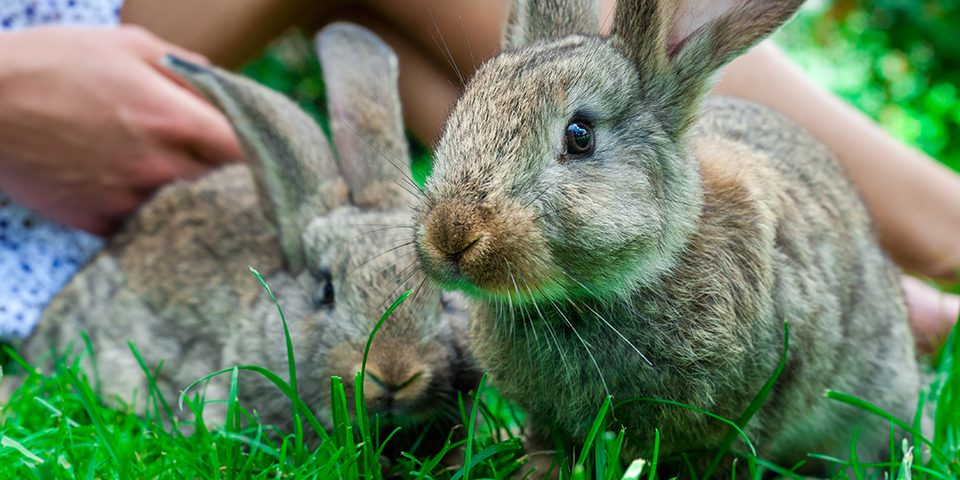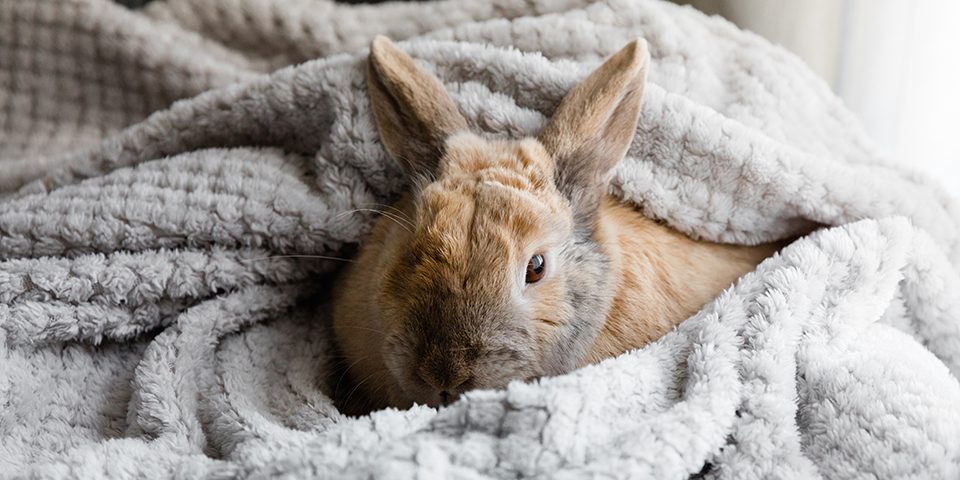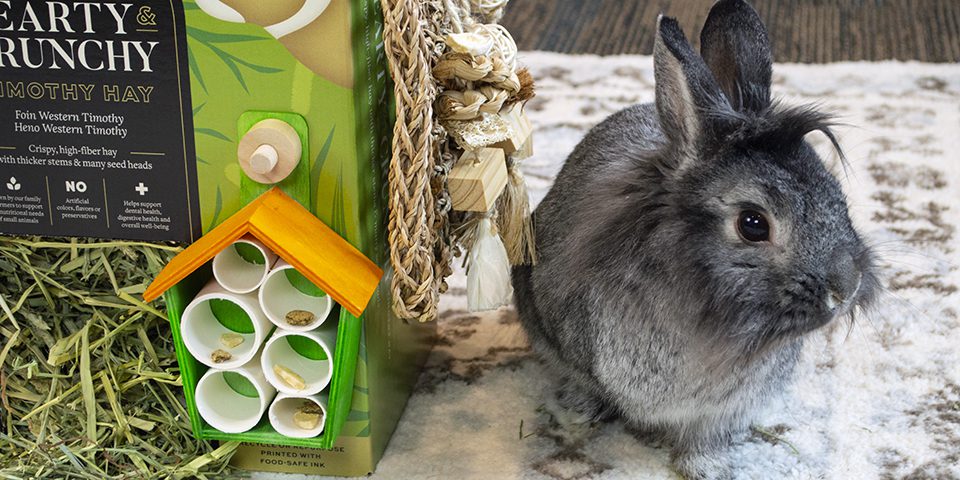by Dianne Cook, LVT, and Kellie Hayden
Updated: February 6, 2024
As pet parents, we all want our fur babies to live forever. Though we have yet to stumble upon that fountain of youth, we can help our furry family members live well into their golden years with proper nutrition and healthcare. For rabbit pet parents, one of the best ways to extend life is by spaying or neutering your bunny.
For decades, veterinarians have been educating us about the benefits of spaying or neutering cats and dogs. Yet rabbit parents are often left wondering if these procedures are appropriate, or even safe, for their little ones.
While no surgical procedure goes without risks, there are several benefits to spaying or neutering your rabbit. In addition to extending rabbit lifespans and preventing unwanted rabbit litters, spaying and neutering can also improve rabbit health, wellness, and behavior.
Below, we’ll explain how spaying or neutering can help your bunny live the longest, happiest, and healthiest life possible.
Should I Spay or Neuter My Rabbit?
Spaying or neutering your rabbit can significantly add to their life expectancy. It can also improve your rabbit’s overall health and wellbeing. The bottom line? Spaying or neutering your rabbit can help them live a longer, fuller life.
The most obvious reason to spay or neuter your rabbit is to combat the risk of reproductive cancers (such as mammary, uterine, ovarian, or testicular cancer). These cancers are dishearteningly common in unaltered rabbits. Intact female rabbits have as high of a 65% chance of developing uterine adenocarcinoma by the age of 4 years. This is an extremely high risk for any species. By spaying or neutering your rabbit, you can eliminate this risk.
Spaying or neutering can also make your rabbit more friendly and affectionate. Spayed and neutered bunnies tend to be more friendly and affectionate toward their pet parents (as well as other pets in the home). They are also generally easier to litter box train, and they are less likely to urinate on people and other pets.
Finally, spaying or neutering will typically remove the urge to procreate. While this is not a behavioral issue, it is an engrained behavior that is impossible to curb in rabbits unless a spay or neuter is performed. Without the desire to constantly procreate, altered bunnies tend to be much easier to introduce to one another. Spayed and neutered bunnies, with proper introductions, may be able to live in coed colonies without the risk of unwanted litters.

At What Age Should My Rabbit Be Spayed or Neutered?
When possible, it is preferable to spay or neuter your little one before health concerns or problematic behaviors arise. The easiest way to ensure this is to have the surgeries completed when your bunny is still young.
In most cases, the best time to spay a female rabbit is when she reaches sexual maturity, around 3 to 6 months of age.
Similarly, the best time to neuter a male rabbit is when his testicles have descended. Again, this is usually around 3 to 6 months.
Depending on your rabbit’s size, breed, and current health, however, your veterinarian may feel it best to wait until your rabbit is a little bit older. This is yet another reason why routine visits with an exotics savvy veterinarian are so important–when a veterinarian has already met your bunny and has gained a baseline on their health and behaviors, they can provide more personalized health information for your little one.
What About Spaying and Neutering for Older Bunnies?
Just like humans, as animals age, anesthesia can become riskier. Though opinions vary, most exotics veterinarians agree the benefits of a spay or neuter often outweigh the risks, even in older adult rabbits. However, older bunnies will need more extensive pre-surgical screening and may take longer to recover.
If your rabbit has already reached their senior years (5+ years old), you should have a serious discussion with your veterinarian on if spaying or neutering is the right thing to do. This will help you decide whether the procedure is safe for your bunny, and whether or not the surgery will still provide the intended benefits.
Is it Safe to Get My Rabbit Spayed or Neutered?
No matter how safe or routine, all anesthetic procedures include some level of risk. With that said, spaying and neutering rabbits is a safe, low-risk procedure when performed by a veterinarian who is experienced with rabbits. The benefits of spaying and neutering rabbits vastly outweigh the minimal risk in the majority of cases.
Before scheduling the surgery, make sure your veterinarian is well-versed in rabbit surgery and post-operative care. To find a rabbit-savvy vet near you, check out the House Rabbit Society’s veterinarian listings or the Association of Exotic Mammal Veterinarians.
You’ll also want to confirm that your vet understands the benefits, risks, and potential complications of spaying and neutering. To help, we recommend asking your vet the following questions before having your rabbit spayed or neutered.
Questions to Ask Your Veterinarian Before Spaying or Neutering Your Rabbit
- How long have you been seeing exotics animals, specifically rabbits?
- How many rabbits do you see in your office annually?
- On average, how many spays/neuters do you perform on rabbits each year?
- What is your success rate?
- Have you ever lost a rabbit during surgery? If so, what was the cause?
- Should my rabbit fast before surgery?*
- What are your anesthetic protocols?
- What precautions and supportive measures do you have in place before, during, and after surgery?
- Can you please describe the surgery?
- What is your typical post-operative plan?
- What kind of pain medications and antibiotics will be provided for aftercare?
- Do you suggest feeding a recovery diet (like Critical Care) after surgery?
* The answer to “should my rabbit fast before surgery?” should be an emphatic “no.” Rabbits are unable to vomit or regurgitate, so there is no need to withhold food or water before surgery. In fact, doing so could cause your bunny to go into gastrointestinal stasis, making the entire situation much riskier. If your vet answers “yes” to this question, they maybe more versed in dog or cat spays. It is likely you will want to find a veterinarian who does not fast rabbits before surgery.

How Are Spay and Neuter Procedures Performed on Rabbits?
Both spay and neuter surgeries will require your rabbit to be fully anesthetized. Anesthetized animals’ vital signs (such as heart rate, respiratory rate/effort, blood pressure, temperature, and others) should be monitored closely by trained personnel throughout the entire procedure.
A spay (ovariohysterectomy) is the procedure performed on female rabbits. For a veterinarian to properly and safely spay a rabbit, the hair is shaved from her abdomen, her skin is disinfected, and an incision is made through her abdominal wall. Blood vessels are tied off and her uterus and ovaries are removed before she receives several layers of sutures to close her up.
A neuter (orchiectomy) is the procedure performed on male rabbits. This is often a quicker procedure and therefore requires less time under anesthesia. After the hair has been removed from around your rabbit’s scrotum and the skin has been adequately disinfected, an incision is either made directly into the scrotum, or just before it, and the testes are tied-off and removed. The resulting incision can either be closed by the veterinarian or be left open to close on its own.
How Do I Care for My Rabbit After Spaying or Neutering?
Most rabbits do very well after spaying or neutering and heal without incident. However, it’s critical to watch your rabbit closely, monitor their incisions, and make sure they are eating.
As prey species, rabbits are hardwired to hide any signs of illness or pain. It is your job as a dedicated pet parent to provide them with a safe, comfortable environment and carefully watch them as they heal. Watch for any signs, regardless of how subtle, that may indicate your kiddo needs additional support (decreased appetite, decreased water intake, abnormal fecal output, behavior changes, etc). Take a look at our guide to post-operative care for more information.
Neutering Aftercare for Male Rabbits
Though each rabbit is different, many males will come home after neutering hungry and ready for a snack. Males can store semen in their bodies for up to 3 weeks after being neutered. Because of this, you will need to keep your male rabbit away from any intact females during the first 3 weeks of recovery to avoid an unexpected litter. Make sure your rabbit has unlimited access to grass hay and water, and make sure they are receiving medication and supplemental food as prescribed.
Spaying Aftercare for Female Rabbits
Because females undergo a more extensive procedure, they may want to be left alone after surgery. They may also want to avoid being handled or moved around for several days. It is usually best to respect these wishes of solitude. Make sure your bunny has plenty of fresh grass-hay and water, and is getting her daily prescriptions or suggested supplemental diet.
Wound Care & Pain Management
If you notice your bunny licking, chewing, or scratching at their incision, reach out to your veterinarian for suggestions on how to curb this behavior so the surgical site does not break open.
Pain management is essential to the healing process, so make sure your pet is receiving the proper dosage of what has been prescribed by your veterinarian.
Behavioral Change Timelines
Remember that spaying and neutering may not be an instant fix, especially for behavioral issues. Hormone levels can take a while to stabilize after surgery, so less-than-desirable behavioral patterns may continue for several weeks to a couple of months after the procedure.
If your furry friend was altered well after reaching sexual maturity, some dominant behaviors (hair pulling, humping, circling, etc.) may have become engrained. Discuss any especially worrisome behaviors with your veterinarian prior to the surgery in order to establish appropriate expectations.

Spaying and Neutering: An Important Procedure for Rabbits
While spaying or neutering your rabbit is not the key to eternal life (most regrettably), it has been proven to significantly increase overall health and longevity. These surgeries also often have the added benefit of making your rabbit a more affectionate companion and reducing problematic behaviors.
Though every surgical procedure comes with a certain level of risk, as a dedicated and knowledgeable pet parent, you can help decrease these risks. By finding a rabbit-savvy veterinary team, you can increase the chances of a successful surgery.
The decision to have a spay or neuter performed on your bunny certainly isn’t easy, and should never be taken lightly. However, by knowing what to expect and advocating for your fur baby, you can help ensure your bunny experiences a smooth procedure and a quick, comfortable recovery.
